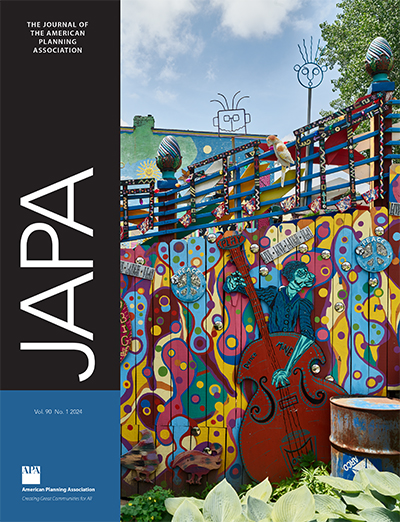Development Fees and Park Equity in Los Angeles
IF 3.4
2区 经济学
Q1 REGIONAL & URBAN PLANNING
Journal of the American Planning Association
Pub Date : 2023-04-26
DOI:10.1080/01944363.2023.2201279
引用次数: 0
Abstract
Problem,research strategy, and findings: Parks are inequitably distributed in many U.S. cities, and policies and planning initiatives around the country have sought to rectify these inequities. In this study, we examined whether one such initiative, a policy change in development fees for parks in Los Angeles (CA), achieved its equity goals. Specifically, the changed Park Fees Ordinance loosened the distance requirements between developments where fees are collected and parks where fees can be invested to create opportunities to spend funds in disadvantaged neighborhoods with little development. We examined whether disadvantaged communities received more park fees after the policy change in 2017. We found no significant equity gains based on socioeconomic status, some gains for non-Hispanic Black people, but some losses for Latinx people. We attribute these findings to a lack of equity criteria in the policy, political pressures, capital renovations to address deferred maintenance, and geographic limitations in where funds can be spent. We also found that Los Angeles seemed to have taken advantage of the increased geographic flexibility in the changed policy, although a lack of data linking fee-generating developments to fee-receiving parks limited the certainty of this finding. Takeaway for practice: Park fees are not a panacea to advance park equity. Yet park fee policies could include measurable equity criteria to help direct some funds to disadvantaged park-poor communities while leaving some funds to the discretion of elected officials. Also, cities should have transparent data about the generation and distribution of park fees.洛杉矶的开发费用和公园股权
问题、研究策略和发现:美国许多城市的公园分布不公平,全国各地的政策和规划举措都试图纠正这些不公平现象。在这项研究中,我们考察了其中一项举措,即洛杉矶公园开发费的政策变化,是否实现了其公平目标。具体而言,修改后的《公园收费条例》放宽了收费开发项目和可投资公园之间的距离要求,以创造机会将资金花在几乎没有开发项目的弱势社区。我们调查了2017年政策变化后,弱势社区是否获得了更多的公园费用。我们没有发现基于社会经济地位的显著股权收益,非西班牙裔黑人有一些收益,但拉丁裔人有一些损失。我们将这些发现归因于政策中缺乏公平标准、政治压力、为解决延期维护问题而进行的资本翻修,以及资金使用的地域限制。我们还发现,洛杉矶似乎利用了改变后的政策中增加的地理灵活性,尽管缺乏将收费开发与收费公园联系起来的数据限制了这一发现的确定性。实践经验:公园收费并不是提高公园股权的灵丹妙药。然而,公园收费政策可能包括可衡量的公平标准,以帮助将一些资金直接用于处境不利的公园贫困社区,同时将一些资金留给民选官员自行决定。此外,城市应该有关于公园费用产生和分配的透明数据。
本文章由计算机程序翻译,如有差异,请以英文原文为准。
求助全文
约1分钟内获得全文
求助全文
来源期刊
CiteScore
11.00
自引率
10.70%
发文量
80
期刊介绍:
For more than 70 years, the quarterly Journal of the American Planning Association (JAPA) has published research, commentaries, and book reviews useful to practicing planners, policymakers, scholars, students, and citizens of urban, suburban, and rural areas. JAPA publishes only peer-reviewed, original research and analysis. It aspires to bring insight to planning the future, to air a variety of perspectives, to publish the highest quality work, and to engage readers.

 求助内容:
求助内容: 应助结果提醒方式:
应助结果提醒方式:


